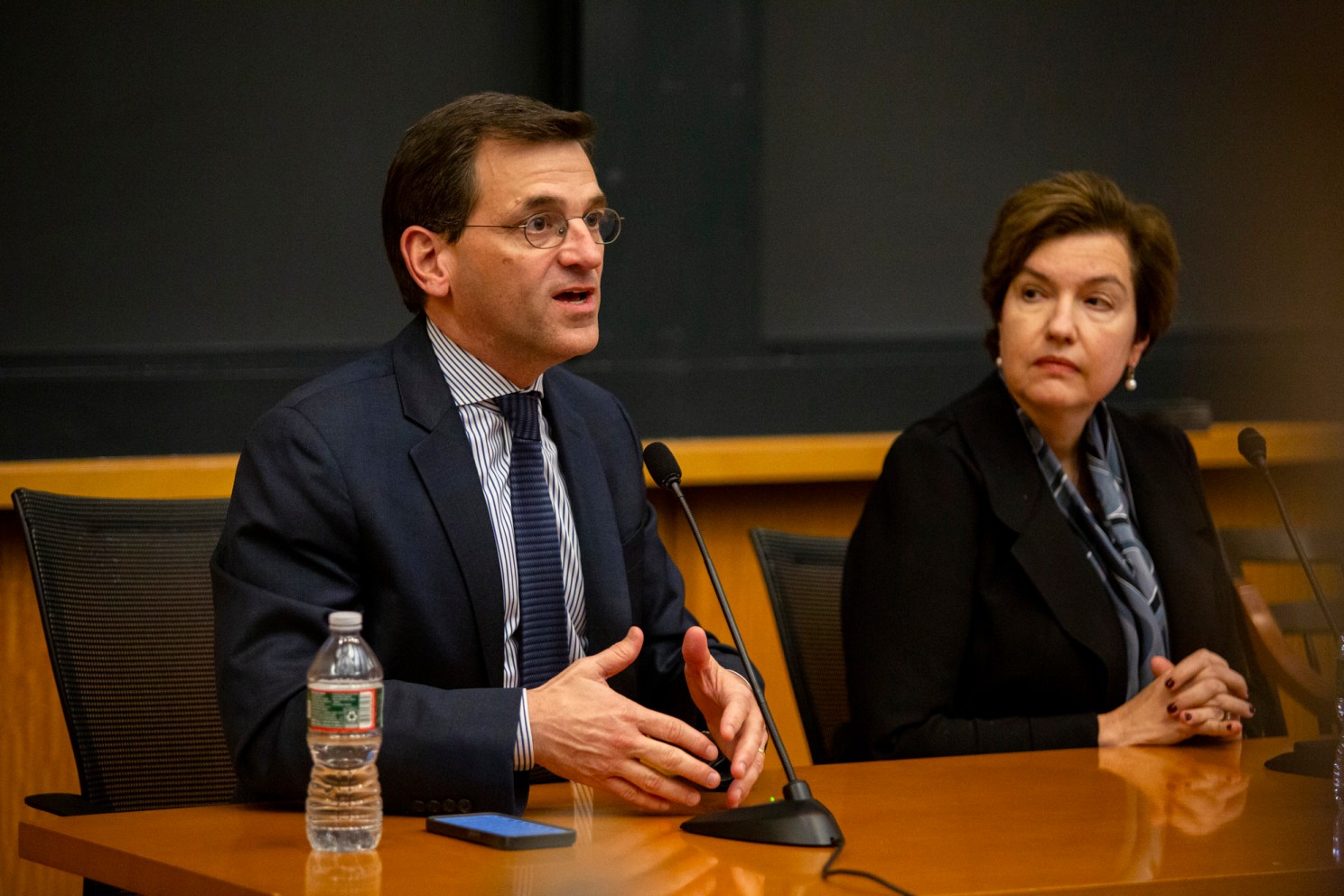What’s ahead for U.S. foreign policy in ‘Trump 2.0’?

Peter Baker and Susan Glasser.
Photo by Grace DuVal
Peter Baker and Susan Glasser predict push to end Ukraine war on Russia’s terms, instability for NATO
President-elect Donald Trump is moving swiftly to announce Cabinet and other appointments for a second term in office, which many observers expect to pick up where he left off in January 2021 on major policy issues like immigration, trade, and foreign relations.
What will be different, say veteran Washington journalists Susan Glasser ’90, and Peter Baker, is the speed at which Trump will move to advance his agenda, with a likely boost from a Republican majority in Congress.
“Trump 2.0 is Trump on steroids,” Baker, senior White House correspondent at The New York Times, told moderator Yevgenia Albats, Ph.D. ’04, a Russian journalist and political scientist. The discussion on Tuesday with Baker and Glasser, a staff writer for The New Yorker, examined what U.S. policy with Russia, China, and the European Union may look like during a second Trump administration.
The pair, who are married, served in Moscow as co-bureau chiefs for The Washington Post from 2001 to 2004, and have written several books together, including “Kremlin Rising: Vladimir Putin’s Russia and the End of Revolution” in 2005 and “The Divider: Trump in the White House 2017-2021” in 2022.
Unlike in 2016, when he ran as a celebrity businessman who wanted to shake up Washington, Trump will return to the White House in January having run on “an explicit campaign of revenge and retribution,” according to Glasser, and intending to take care of what he sees as “unfinished business,” namely to “fundamentally reorient” U.S. foreign policy to his own more isolationist view of the country’s role in the world.
Trump has more experience now in how to use the levers of presidential power. And his loyalist picks for secretaries of state and defense and national security adviser — Sen. Marco Rubio, Army veteran and Fox TV host Pete Hegseth, M.P.P. ’13, and Rep. Mike Waltz — lack deep experience in foreign policy and will likely do little to restrain Trump’s plans, unlike their counterparts in Trump’s first term, they said.
“If you look [at] who’s in the room making decisions right now, there is no dissent,” Baker noted.
The fate of Ukraine is likely to be among the first matters Trump takes up.
The incoming president, who has reportedly engaged in back-channel talks with Putin, made a campaign promise to end the Ukraine war quickly. He is almost certain to cut off U.S. aid to Ukraine and try to broker a deal that will favor Russia, the pair told Albats, editor in chief of The New Times, an independent Russian language news outlet, and a visiting scholar at the Davis Center for Russian and Eurasian Studies at Harvard.
NATO’s fate in a second Trump term is unclear. As the president-elect demonstrated in his first term, “He has no interest and no commitment whatsoever to defend, frankly, anybody, but especially the Eastern European countries,” said Baker.
Even without a formal withdrawal by the U.S., as Trump repeatedly threatened during his first term, NATO is already weaker than it was before Nov. 5, he said.
“If you’re an adversary of NATO, Article 5 [which calls for the nations to defend one another if attacked] is meaningless, because if it’s a conditional thing, depending on the mood of the president of the United States as opposed to a solid commitment, it’s a dead letter,” said Baker.
“He has, just by getting elected, undercut NATO in a way that it has not been undercut” since its beginnings after World War II amid concerns over the rise of the Soviet Union as a nuclear power, he said.




